Merchant Of Venice Act 5 Scene 1 Questions And Answers
ICSE SolutionsSelina ICSE SolutionsML Aggarwal Solutions
EnglishMathsPhysicsChemistryBiology
Act 5 Scene 1 Merchant Of Venice Workbook Important Question Answers
Passage – 1 (Act V, Sc.I, Lines 49-65)
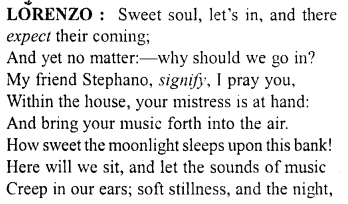
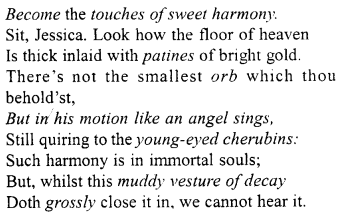
Paraphrase :
LORENZO : Sweet soul, let’s go in, and wait there for them to come. And yet, it doesn’t matter; why should we go in’? My friend Stephano, let them know, please, Within the house, that your mistress is at hand, And bring your music outside. How sweet the moonlight sleeps on this bank! We will sit here and let the sounds of music Creep into our ears; soft stillness and the night Compliment the touches of sweet harmony. Sit, Jessica: look how the sky Is covered thick with layers of bright gold; Even the smallest star that you see Sings like an angel as it moves, Still singing like a choir to the young-eyed cherubs; Such harmony is in immortal souls;. But, while this muddy earth of decay Buries us, we can’t hear it
Word Meaning With Annotation
Expect : await, signify : make known the fact, become : suit. touches of sweet harmony : notes of sweet music, patines : plates, orb : star, but in his motion like an angel sings : that does not produce sweet music, young-eyed : bright-eyed, cherubins : angels, muddy vesture of decay : body of perishable flesh, grossly : so as to make our souls gross or dull.
Read the above passage and answer the following questions
Question 1.
What does Lorenzo suggest to his sweet heart?
Answer:
Lorenzo suggests to his beloved that they should go inside and wait for the arrival of Bassanio and Gratiano. Then he drops the suggestion.
Question 2.
What does Lorenzo tell Stephano to signify?
Answer:
Lorenzo tells him to go and tell the servants that their mistress was about to come and they should bring their musical instruments in the open air.
Question 3.
Describe the moon-light scene and the playing of music.
Answer:
The moon-light is falling gently on the bank. Musicians are playing on the musical instruments. A soft silence and the time of night befit the playing of musical instruments.
Question 4.
Describe briefly the beauty of the sky.
Answer:
The sky is studded with the bright, golden stars. Even the smallest planet produces an angelic music.
Question 5.
Why cannot human beings hear the music of spheres?
Answer:
Human beings cannot hear the music of the Spheres because their bodies are made of insensitive clay.
Passage – 2 (Act V, Sc.I, Lines 70-87)

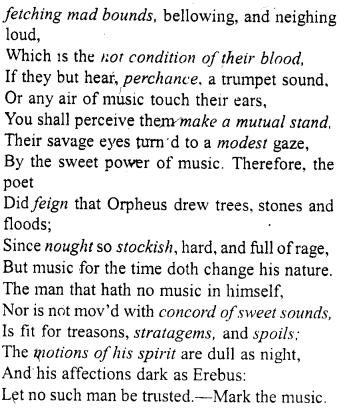
Paraphrase :
LORENZO : The reason is your spirits are observant; Because only look at a wild and wanton herd, Or race of youthful and unhandled colts, Pushing crazy limits, bellowing and neighing loudly Which is the hot condition of their blood; If they only hear may be a trumpet sound, Or any air of music touches their ears, You will see them make a mutual stop, Their savage eyes turned to a calm gaze By the sweet power of music: so the poet Pretended that Orpheus drew trees, stones, and floods; Only music for the time changes his nature From not so wooden, hard, and full of rage. The man that has no music in him, Or is not moved by harmony of sweet sounds,’ Is fit for treasons, plots, and stealing; The movement of his spirit is as dull as night, And his affections are as dark as the place between Earth and hell. Don’t trust such a man. Listen to the music.
Word Meaning With Annotation
Attentive : rapt in attention, wanton : mischievous, race : breed, unhandled colt: young horses not broken in. fetching mad bounds : bounding madly, hot condition of their blood : their own natural wild condition, perchance : by chance, make a mutual stand : come to a standstill together, modest : mild, feign : imagine, nought : nothing, stockish : unfeeling, concord of sweet sounds : sweet melody, stratagems : plots, spoils : thefts, motions of his spirits : his thoughts and feelings
Read the above passage and answer the following questions
Question 1.
What effect does music produce on wild horses?
Answer:
Wild horses become lame on hearing music.
Question 2.
What impact did Orpheus create by the power of his music?
Answer:
Orpheus had the power to draw trees, stones and floods to him with his music.
Question 3.
How does Lorenzo characterise a man who does not like music?
Answer:
Such man is fit for treacherous actions, plots and acts of plunder. The impulses of the mind of such a person are dull as the time of night. His feelings are as dull as the regions of hell.
Question 4.
Is a man also does not love music reliable?
Answer:
He is not reliable.
Question 5.
What do you understand by treasons, stratagems and spoils?
Answer:
Treasons mean treacherous deeds, Stratogems are Conspiracies and spoils are looting.
Passage – 3 (Act V, Sc.I, Lines 147-158)
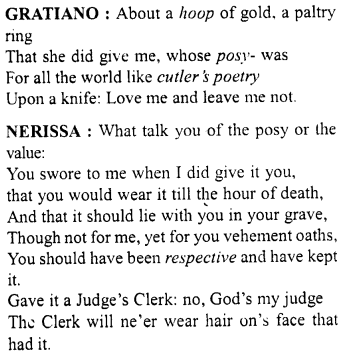
Paraphrase :
GRATIANO : About a hoop of gold, a worthless ring That she gave me, whose inscription was, For all the world, like knife maker’s poem on a knife, “Love me and leave me not.”
NERISSA : Why do you talk of the inscription or the value? You swore to me, when I gave it you, That you would wear it until the hour of your death, And that it would go with you to your grave; You should have respected and have kept it Though not for me, but for your intense oaths. Gave it a judge’s clerk! No, God’s my judge, The clerk will never grow a beard that took it.
Word Meaning With Annotation
Hoop : circle, ring, posy : a short verse of poetry, cutler’s poetry : verses or mottos engraved on knife- blades. respective : scrupulous, careful.
Read the above passage and answer the following questions
Question 1.
Which quarrel is referred to in the extract? What does Shakespeare want to show by introducing a quarrel among the lovers?
Answer:
The quarrel referred to in the extract is between Gratiano and his wife Nerissa. This is about the ring given by Nerissa to her husband which he does not have in his possession now.
Shakespeare introduces a quarrel among the lovers to produce the comic effect in the serious atmosphere’ of the play. ‘The Merchant of Venice’ assumes the seriousness of a tragedy, particularly in the Trial Scene when Antonio’s life is threatened by the forfeiture of the bond. The playwright introduces the ring episode to relieve the tension. Thus, the play concludes happily. „ The quarrel itself is a practical joke played by Portia and Nerissa on their husbands.
Question 2.
Give the meaning of :
(a) a hoop of gold
(b) cutler’s poetry.
Answer:
(a) A ‘hoop’ is a circular band of metal or anything, here made of gold. It is contemptuously used for the ring. Gratiano wants to minimise the importance of the ring so that there may not be much fuss about it.
(b) It was customary to have inscriptions on spoons and table knives. They were perhaps not so poetical in tone. Gratiano says humorously that the motto inscribed on the ring was like the one on a piece of cutlery. It was the least poetic.
Question 3.
Who had given the ring to Gratiano? What promise was made by him at that time about the ring?
Answer:
Nerissa had given the ring to Gratiano soon after their marriage. At that time. Gratiano had made the promise to his wife that this ring was a token of her love, and he would never lose it.
Question 4.
To whom did Gratiano give the ring? Why? What is the practical joke about the ring episode?
Answer:
Gratiano gave the ring to the lawyer’s clerk. The practical joke about the rings is that he actually gave it to none other than his own wife. Nerissa who was disguised as the lawyer’s clerk. Nerissa had herself demanded it in order to tease his husband on returning home. Gratiano was unable to recognise the lawyer’s clerk in the new out fit.
Question 5.
What does Portia say about the quarrel referred to in the extract?
Answer:
On hearing the sharp exchange of words between Nerissa and Gratiano; Portia comments that there is a quarrel so soon after their marriage. She does not expect such a development.
Question 6.
Why did Portia join in accusing Gratiano of doing wrong ? what did she say about the ring she had given to Bassanio, before she had finished speaking against Gratiano?
Answer:
Portia soon joins Nerissa in accusing Gratiano for so non-seriously parting with his wife’s first present to him. She does so to caution Bassanio that a similar attack is going to be launched on him for a similar lapse. She concludes her speech by saying that if Bassanio ever behaved in this manner, she would go mad in grief.
There is a dramatic irony in this speech of Portia’s. She naturally takes the side of the woman in this loving battle between sexes. Thus she cleverly introduces the parallel quarrel about her own ring, reminding them that there was a ringing similarly given by her to Bassanio. She is deliberately making the situation uncomfortable for Bassanio, and increasing the effect of irony for the delight of the audience.
Passage – 4 (Act V, Sc.I, Lines 200-212)
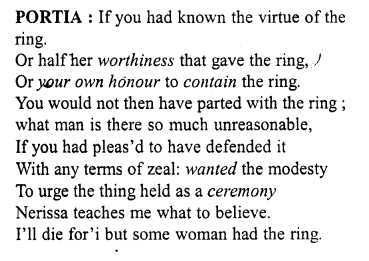
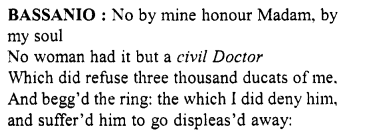
Paraphrase :
PORTIA : If you had known the virtue of the ring, Or half the worthiness of her who gave the ring, Or your own honor to hold the ring, You wouldn’t have parted then with the ring. What man is there so very unreasonable, That, if you had’ bothered to defend it With any terms of earnestness, lacked the modesty To encourage the thing be held as a ceremony? Nerissa teaches me what to believe : I’ll die for it, but some woman took the ring.
BASSANIO : No, by my honor, madam, by my soul, No woman took it. but a civil doctor, Which refused three thousand ducats of me, And begged for the ring, which I denied him, And let him go away displeased.
Word Meaning With Annotation
Worthiness : ment. your own honour : your duty as an honourable man. contain : preserve, wanted : lacked, ceremony : a sacred pledge, civil doctor : doctor of civil law, lawyer.
Read the above passage and answer the following questions
Question 1.
What defence has Bassanio given in the lines preceding the passage, for losing the ring?
Answer:
In the lines preceding this passage, Bassanio makes an earnest plea while explaining the circumstances in which he was compelled to part with the ring. He is sure that Portia will excuse him if she comes to know to whom the ring was given away. She will understand if she learns for whom it was done, and last of all, the reluctance with which it was finally given to the lawyer.
Question 2.
How does Portia reject his argument to magnify his offence?
Answer:
Portia seems to reject her husband’s argument. She is equally vehement in magnifying his offence of parting with the marriage ring soon after his marriage.
Portia rejects Bassanio’s plea as incredible. She thinks that if he had zealously defended the ring, no man would have been so unreasonable and unmannerly to ask for the ring which was a ceremonious gift.
Question 3.
What effect the repetition of the word ‘ring’ achieves?
Answer:
Portia succeeds in seriously embarrassing her husband. She achieves the effects of strong emphasis by repeating the word ‘ring’ at the end of each line four times.
Question 4.
Is Portia right in accusing her husband that he gave the ring to some other woman?
Answer:
Portia is right in accusing her husband for giving away the ring to ‘some woman’. But, as the audience know, the woman whom he gave the ring was no other than Portia herself, without knowing it.
Question 5.
How far is Bassanio truthful in saying that he did not give the ring to any woman?
Answer:
Bassanio is truthful when he swears that he did not give the ring to a woman. He gave it to the lawyer, who appeared to be a youngman. He gave it unwillingly under pressing circumstances. This too is true. And yet he gave it unknowingly to the ‘young man’ who was actually a young woman’, i.e. Portia herself.
Question 6.
What is the source of amusement in this dialogue?
Answer:
This dialogue should be very amusing for the audience. The pleasure is derived from the fact that what Bassanio and Gratiano do not know, is well known to the audience. It is a delightful situation to watch young husbands being be fooled and teased by their newly-wedded wives.
Passage – 5 (Act V, Sc.I, Lines 223-246)
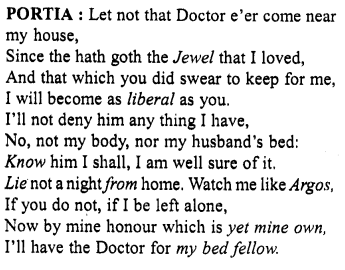
Paraphrase :
PORTIA : Don’t let that doctor ever come near my house; Since he has gotten the jewel that I loved, And which you swore to keep for me, I’ll become as free as you; I won’t deny him anything I have, No, not my body, nor my husband’s bed. I shall know him, I am well sure of it. Don’t sleep a night from home; watch me With one hundred eyes; if you don’t, if I am left alone, Now, by my virginity which is still my own, I’ll have that doctor for my lover.
Word Meaning With Annotation
Jewel : costly ring, liberal : generous, know : recognise, lie : sleep, from : away. Argos : a hundred eyed monster, yet mine own : still intact, my bed fellow. : sleep with me, rut with me.
Read the above passage and answer the following questions
Question 1.
Who speaks these words? To whom are these addressed? Where are these persons?
Answer:
Portia is the speaker of these words, and she is in conversation with Bassanio. They are in Belmont at Portia’s residence. Both have returned from Venice after attending Antonio’s trial.
Question 2.
Who is the ‘doctor’ referred to in the lines? Has the other person said something earlier?
Answer:
The doctor referred to is the Doctor of Law, whom Bassanio referred to as the civil doctor. He is the person who interpreted the Venetian law in the court of the Duke in the dispute between Shylock and Antonio.
Question 3.
Which Jewel has the doctor taken away? What is the speaker’s complaint?
Answer:
Portia complains that the doctor has taken away the ring which was given by her to her husband as a token of her love. This she mentions as a Jewel’. By this she means a precious thing.
Question 4.
Why does the speaker say the following? “Let not the Doctor e’er come near my house.”
Answer:
Portia has heard Bassanio’s version of how he.could not resist the doctor’s earnest demand for the ring. She now says that if the doctor was so very persuasive, then Bassanio must see to it that he does not come that way. If he could while away the ring from his finger, it was just possible the same doctor may succeed in prevailing upon her to part with her most valuable possession, which was her honour and chastity.
Portia here pretends to have great grievance against the doctor. She goes to the extent of saying that she would become as free in her associations as was Bassanio. Then she would not refuse the doctor anything, as a retaliation for Bassanio’s licence.
Question 5.
Does the speaker give any warning to the, other person?
Answer:
Portia warns Bassanio not to stay away from home even for a night. The doctor might come in his absence and form intimate relations with Portia. Bassanio must guard against this possibility.
Question 6.
“Watch me like Argos,” Explain the reference about Argos.
Answer:
Portia wants Bassanio to watch her carefully, i.e. with a hundred eyes, as Argos watched Argos in classical mythology was a person with hundred eyes. Only one of his eyes slept at a time. For this reason, Juno directed him to keep watch over another goddess with whom Jupiter had fallen in love.
Passage – 6 (Act V, Sc.I, Lines 267-279)
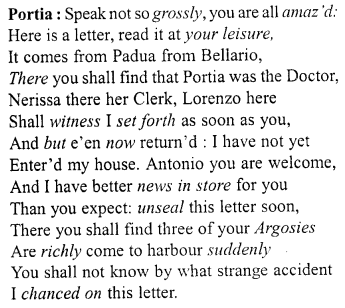
Paraphrase :
PORTIA : Don’t speak so indecently. You are all amazed: Here is a letter; read it at your leisure; It comes from Padua, from Bellario: There you shall find that Portia was the doctor, Nerissa there, her clerk: Lorenzo here Shall witness that I set out as soon as you left, And even just now returned; I have not yet Entered my house. Antonio, you are welcome; And I have better news in store for you Than you expect: unseal this letter right away; There you shall find three of your merchant ships Have richly come into harbor suddenly.You will not know by what strange accident I happened to get this letter.
Word Meaning With Annotation
Grossly : in a vuglar way. amaz’d : astonished, your leisure : in your free time, there : in that letter, witness : support my statement, set forth : started, but e’en now : a moment ago, just now. news in store : waiting for me. unseal : open. Argosies : merchant ships, richly : laden with rich Cargo, suddenly : by chance, chanced on : happened to get.
Read the above passage and answer the following questions
Question 1.
“Speak not so grossly, you are all amazed,” Portia advises not to speak ‘grossly’. What have they been talking? Why are they amazed? Who are the other people present there.
Answer:
They had been talking something indecent. Portia said that she would sleep with the young lawyer if he came there. Nerissa said that she would have relations with the lawyer’s clerk. All this was said to tease Bassanio and Gratiano. At last, Portia decides to stop talking in that manner.
All are amazed to see that Portia has got the ring which Bassanio presented to the doctor of the laws. Similarly. Nerissa has the ring which Gratiano gave to the lawyer’s clerk. This amazement changes into embarrassment to hear from the two woman that they slept with other men to secure these rings.
Question 2.
Which letter is being shown by Portia? What is the need of showing this letter?
Answer:
Portia is showing them a letter written by Dr. Bellario of Padua, authorising Portia to act as his representative while arguing the case in the court of the Duke in Venice.
She needs to show this letter to those present there to prove to them that the doctor who defended Antonio in the court was no other person that Portia herself. Bassanio, Gratiano, Antonio and others are listening to her account in sheer amazement.
Question 3.
What are the new facts revealed by Portia? Where has she come from?
Answer:
Portia springs a surprise on everybody by telling everybody that she and Nerissa have just returned from Venice. They had left the house soon after Bassanio and Gratiano left for Venice. – This fact can be confirmed from Lorenzo, who was left in charge of the house in her absence.
Tire new facts revealed by Portia are that she herself acted as the doctor of laws in the court of the Duke. Nerissa stood beside her as her clerk. After concluding the case in the court and extracting the rings from Bassanio and Gratiano, these two clever women rushed back to Belmont to overtake their husbands.
Question 4.
What good news does Portia have for Antonio?
Answer:
Portia has a good news for Antonio. She has a letter with her which gives the information that three of Antonio’s merchant ships laden with merchandise have reached home safely. Antonio had earlier been told that all his ships have been destroyed in the sea. This means that Antonio is once again a rich merchant of Venice.
Question 5.
Does she have any good news for Lorenzo and Jessica? Is Portia anyway responsible for bringing this good news for them?
Answer:
portia does have a very good news for Lorenzo and Jessica. She has with her a deed signed by Shylock beqeathing his share of the property for his daughter and son-in-law. He would have disinherited Jessica who had eloped with a Christian.
Portia has played a vital role in not only saving Antonio’s life, but, also in interpreting law in a manner that pushed Shylock into a tight comer. Half of the Jew’s property went to Antonio and the remaining was left to be used by Shylock in his life time. Thereafter, it goes to Jessica and Lorenzo. In this, Antonio has also played a gracious role. He is to hold half the Jew’s property 1 only as a trust, to pass it on to the Jew’s daughter and son-in-law.
Merchant of Venice Workbook Questions and Answers
- Merchant of Venice Act 1 Scene 1 Workbook Answers
- Merchant of Venice Act 1 Scene 2 Workbook Answers
- Merchant of Venice Act 1 Scene 3 Workbook Answers
- Merchant of Venice Act 2 Scene 1 Workbook Answers
- Merchant of Venice Act 2 Scene 2 Workbook Answers
- Merchant of Venice Act 2 Scene 3 Workbook Answers
- Merchant of Venice Act 2 Scene 5 Workbook Answers
- Merchant of Venice Act 2 Scene 6 Workbook Answers
- Merchant of Venice Act 2 Scene 7 Workbook Answers
- Merchant of Venice Act 2 Scene 8 Workbook Answers
- Merchant of Venice Act 2 Scene 9 Workbook Answers
- Merchant of Venice Act 3 Scene 1 Workbook Answers
- Merchant of Venice Act 3 Scene 2 Workbook Answers
- Merchant of Venice Act 3 Scene 3 Workbook Answers
- Merchant of Venice Act 3 Scene 4 Workbook Answers
- Merchant of Venice Act 3 Scene 5 Workbook Answers
- Merchant of Venice Act 4 Scene 1 Workbook Answers
- Merchant of Venice Act 5 Scene 1 Workbook Answers
